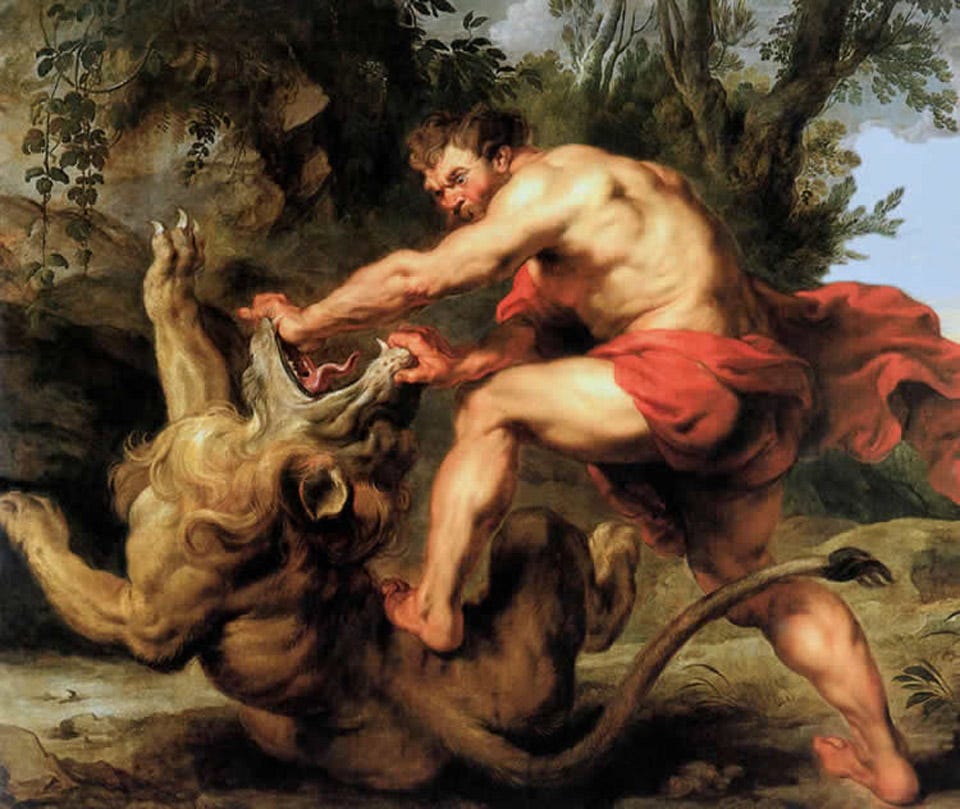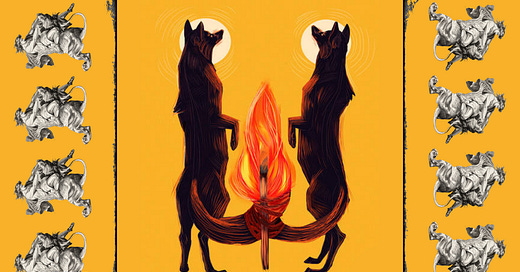
Do you like bizarre stories? I sure do.
And no, not your typical soccer-mom-esque-macabre-murder-mystery on Netflix. (Sorry, soccer moms. But ya’ll got problems.)
I mean weird stuff, whether in the annals of ancient history or the bywords of your local paper. Maybe you can relate; you’ve always been drawn to odd tales found in The Twilight Zone, the Sci-Fi channel or your nine-fingered uncle’s rickety dining table.
Me? I especially love weird stories in the Scriptures.
One of my favorite scholars often said this regarding the Bible: “if it’s weird, it’s probably important.”1
One such story is found in the Old Testament book of Judges; an episode in the life of a man named Shimshon, from the foothills of a village called Tzorah.
You know him as Samson. But check your Sunday-school stories at the door.
Samson is a tragic figure. The definition of an anti-hero. A mixed bag.
Announced by angels. Vengeful. A laundry list of vices and character flaws. Easily enraged. Divinely empowered. Immaturity rampant in his soul: he takes things way too far, breaks commitments, struggles with sexual impurity, unhealthy relationships. At times, zeal for God peaks out, yet he continually falls short of his potential.
Sound familiar? If not, look in a mirror. It probably sounds like some of you.
[Yikes! Sorry. I mean us. Some of us.]
In the story, he falls for a Philistine woman and wants to marry her. Huge no-no for Israelites. On top of that, his apparent (cringey) motivation was sexual, reassuring his parents “Get her for me, for she looks good to me.”2
Wow. Way to unfold an enchanting love story.
EXCURSUS(?)
PAUSE.
Have you ever pursued something you knew in your bones was not God’s desire for you? I think we all have. You’ve probably also noticed another thing: rebellion produces more rebellion.
You lie. Then you lash out. After that, you take something you shouldn’t or agree with the words of fallen spirits. One act of rebellion spawns a litany of tiny rebellions. It’s why Lewis said “fallen man is not simply an imperfect creature who needs improvement: he is a rebel who must lay down his arms.”3
Humans must “lay down (our) arms” to Christ’s authority in a million little decisions each day. There’s the rub.
Ultimately, we have an authority problem. So did Samson.
Over and over again, he refused to submit to God’s ways.
Along the way to get his forbidden bride, a lion ferociously attacks him. Samson stops — his body is imbued with the ruach Yahweh. He feels invincible. Locking eyes with the beast, he snarls.
It hurls itself through the air at him, claws prepped to eviscerate.
And then… Samson does the thing.
Stepping up, he plants his back foot. He grabs the creature by the neck. With a roar louder than any lion, he unleashes all his strength…
…and snaps it like a toy.

Not bad.
However, the physical beauty of the Philistine girl is driving him forward. He probably knows he shouldn’t, that God doesn’t want this kind of union for His inheritance.4 The angel said the LORD would use him to deliver Israel. He was to be set apart. Different. Clean.
Yet Samson pursues her anyway. Not good.
Then days later, he sees the lion. Rotting, pungent carrion, with flies everywhere. But more than flies; there were bees. Why?
Ah… honeycomb. It looked good to him (like the woman did), so he took some. From a dead body. Something unclean, forbidden to touch. Really not good.
Samson goes back to the woman (who’s interestingly nameless).
They become engaged. Like the lion, it smells. It all smells… of rebellion.
But God is working. The whole time.5
During the ceremonial wedding feast, a wager develops between Samson and some of the Philistine guests. If they can’t solve his riddle, they owe Samson thirty linen wraps and thirty changes of clothes.
Laymen’s terms = a grip of really valuable merchandise.
If they do solve it, Samson owes the same to them. Super expensive ego-match.
Long story short, the men threaten Samson’s wife for the answer. At the end of the seven-day party, they present the solution. A very interesting riddle: all about the lion.
“Something strong. Something sweet.”
That’s it. Samson explodes.
In his Spirit-given strength, he goes to a nearby city, kills thirty men, and gives their clothes for the riddle. Samson leaves the feast filled with resentment, leaves his new wife, goes home. Unbeknownst to him, his wife was given by her father to one of Samson’s friends. Cold, huh?
DOWN IN FLAMES
Sometimes anger can cause us to just burst. Funny thing with Samson is his potential connection to solar imagery. He may have very well looked like your typical Ancient Near Eastern idea of a personified sun-deity,6 with his long locks of hair. Especially when he erupted in anger, displaying phenomenal, inhuman feats of strength.
Personally, my ears get red and hot if I’m angry enough. Weird, I know.
Kind of like this story. Weird. It gets weirder.
Samson comes to visit his wife. After her father answers the door, Samson discovers she has been surreptitiously given to another man, and decides to do something crazy.
4 “Samson went and caught three hundred foxes, and took torches, and turned the foxes tail to tail and put one torch in the middle between two tails. 5 When he had set fire to the torches, he released the foxes into the standing grain of the Philistines, thus burning up both the shocks and the standing grain, along with the vineyards and groves.”
— Judges 15:4-5
Excuse me? Back up. Just a bit more. There.
Foxes, or, potentially jackals according to some scholars,7 are known for being clever. We don’t know how Samson did it, but catching three hundred foxes anything, whatever the method employed, is insane. It’s mythic. But I think there’s more.
In the heat of anger, Samson does something incendiary (pun intended) — and my suspicion is, this is what God was after.
You see, the Philistines primary deity was Dāgōn — their powerful provider of abundant harvest. A creator-father-type (who just might be Baal’s dad)8 that ensured their success in agriculture, specifically grain.
And Yahweh sends Samson to destroy the Philistines… what exactly?
GRAIN. Gosh, that’s so good.
Yahweh was picking a fight.
Despite his episodic weaknesses and shortcomings, God uses Samson to launch a direct attack on not only the Philistines, but the demonic spirits behind them. This is a cosmic battle. All-out war. Just like the quickly smoldering shocks of grain, Dāgōn’s gotta go — down in flames.
You may feel like Samson. You may be wildly unreliable at times or inconsistent or struggle with anger.
But you’re being recruited by Yahweh, too.
ABLAZE FOR GOD
The ekklēsia of God (i.e. the Church) is meant to be made up of many people; fellow sons and daughters of God. That’s us.
Conversely, John the Beloved declares that “the whole world lies in the power of the evil one.”9
I believe we are, much like ancient Israel, living in enemy territory. The darkness is unmistakeable. It’s pervasive. Popping up everywhere. Like grain.
The Holy Spirit’s role? The same as Samson in the story.
The Holy Spirit is looking to light you on fire. Not alone, but in true community. Tied to others, launched out to destroy the work of the enemy in your locale. That’s why Jesus came.
“The Son of God appeared for this purpose, to destroy the works of the devil.”
— 1 John 3:8
All of the fruit overgrown from sin and death. Every bit of prostitution and sex-slavery. Every ounce of addiction and drug-trafficking. Every outbreak of violence and murder. Every drop of deception and wickedness. Loneliness, depression and anxiety.
“Burn away the works of the evil one,” He says.
In our time, God desires to show His People the fields of the enemy and let us loose to run — to bring the truth of the Gospel to the places darkness has enslaved humanity. Our need is for Jesus to get a hold of us, much like Paul describes: “I press on so that I may lay hold of that for which also I was laid hold of by Christ Jesus” (Philippians 3:12).
Let Him catch you. Then run. This is the Mission of the Church.
Fire has fascinating effects. It rids of impurities and brings forth the clarity of the element within. It radiates heat, bringing warmth to its environment. It illuminates and attracts the eye. The fire of God is the same way.
It burns away the impurity of our sin and flesh. It radiates heat, bringing the warmth of God's love to the lost and cold. It illuminates us with a glow that attracts people and demands their attention.
This is a cosmic battle. All-out war.
It is imperative that we, as the Church, say “yes, Lord.”
It’s imperative for you. Even if you’re a bit like Samson.
May we long to be the kind of disciples described by Chadwick:
“Spirit filled souls are ablaze for God. They love with a love that glows. They serve with a faith that kindles. They serve with a devotion that consumes. They hate sin with fierceness that burns. They rejoice with a joy that radiates. Love is perfected in the fire of God.”10
— Samuel Chadwick
So…
Firebrands…
Where is God asking you to run today?
Silence and solitude may prove to be a useful tool to hear the LORD’s answer to this vital question. Try putting it into practice each morning.11
You were not made to be dominated by sin and bludgeoned by guilt. God has specific people for you to love, unique environs and victories for you to step into. May you live ablaze for God.
Run, my friends. Run.
Heiser, M. S. (2021, July 23). If Something in the Bible Is Weird, It’s Probably Important. Word by Word. https://www.logos.com/grow/something-bible-weird-probably-important/
Judges 14:1-3
Lewis, C. S. (2002). Mere Christianity. Harper Collins, 38. (You haven't read this? Stop what you're doing. Stick your nose in this now.)
Deuteronomy 7:1-6
Judges 14:4
Mobley, G. (2006). Samson and the liminal hero in the ancient Near East. http://ci.nii.ac.jp/ncid/BA79776205, 7.
Coffman, James Burton. "Commentary on Judges 15:4". "Coffman's Commentaries on the Bible". https://www.studylight.org/commentaries/bcc/judges-15.html. Abilene Christian University Press, Abilene, Texas, USA. 1983-1999. The Hebrew word for “fox” and “jackal” is the same: shualim.
Archi, A. (2004). Translation of Gods: Kumarpi, Enlil, Dagan/NISABA, Ḫalki. Orientalia, 73(4), 319–336. http://www.jstor.org/stable/43078173
1 John 5:19
Samuel Chadwick (2007). “The Way to Pentecost”, CLC Publications.









Super well done. Big fan of Michael Heiser, too, God rest his soul. You are good at seeing and using the symbolism of elements and actions. Jonathan Pageau's Symbolic World, if you haven't already followed him and his brother Matthieu, might be something to investigate. Profound, a bit like Heiser but also different. Keep it weird, friend.
Brother, my soul was so encouraged by this! I really enjoyed how you connected Samson’s recruitment by God for God’s purposes with our (Church) role of heralding the Gospel. I also really enjoy your voice in your writing. Your tone makes bringing in ANE context accessible and enjoyable.